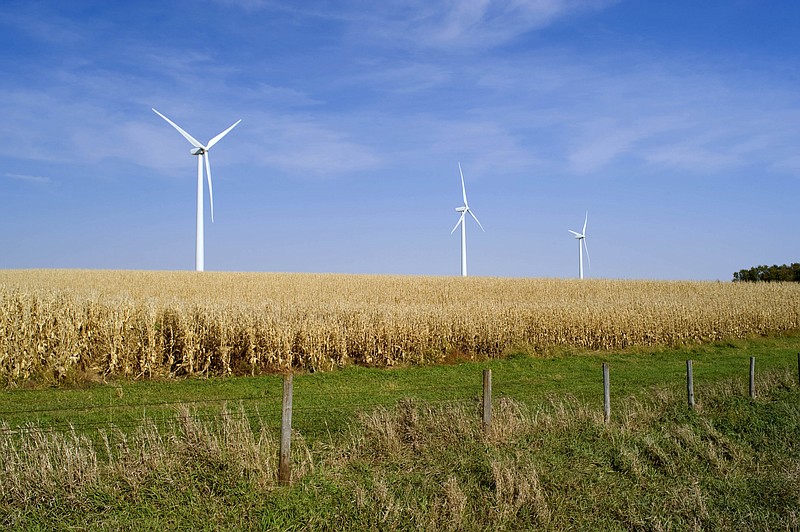The same federal utility that just had its board stacked with a retired coal executive (nominated by the Trump administration and approved by the GOP majority Senate) has now shut its door to an important alternative energy source - cheap wind power from the breezy plains of the Midwest.
"TVA killed what could have been one of the biggest and most important renewable energy projects in America," Stephen Smith, executive director of the Southern Alliance for Clean Energy in Knoxville, told Times Free Press Business Editor Dave Flessner. "This was one of the best renewable energy deals in the Southeast and could have brought 3,500 megawatts of clean, renewable power to our region at an extremely low cost - cheaper than what TVA is now paying for its power."
Six years ago, the Tennessee Valley Authority signed a memorandum of understanding with Clean Line Energy Partners LLC to consider a long-term power supply arrangement along a 700-mile wind energy transmission line the company proposed to build through Oklahoma and Arkansas. The high-voltage, direct-current transmission line, if built, would carry wind-generated electricity from western Oklahoma, southwest Kansas, and the Texas Panhandle to TVA, Arkansas and other eastern markets. The line, expected to be completed by 2020, would end in Memphis, and TVA could have have linked to it to use the wind-generated power for its own distribution across the seven-state TVA region.
But after running out the clock with years of study, TVA President Bill Johnson said the utility would back out of the plan - leaving the Clean Line project twisting in the wind.
Johnson said it didn't make economic sense as TVA already has enough power-generating capacity and, with nuclear power, already is on path to generate more than half of its power from carbon-free sources. He said the "intermittent nature" of wind power would require TVA to build other backup power generators, including natural gas plants, that would offset the promised savings from the wind-generated power sources alone.
That seems disingenuous, at best. If TVA has "enough power generating capacity," then the wind power would be treated much as TVA's current hydro plants are treated: When the rivers are high, TVA uses the cheap water power, and when the wind in the plains is high, TVA would use the wind power. Existing gas-fired plants that can be turned up and down - even off - as necessary would be both filler and mainstay.
TVA already has a monster power grid control room - one that constantly adjusts the power flow from its 74 power plants (eight coal, three nuclear, 29 hydro, nine natural gas combustion-turbine, seven natural gas combined-cycle, one diesel, 15 solar, one wind and one pumped storage) in the Southeast.
If wheeled-in wind from a grid was only one of two or three power sources, then Johnson's contention about needing backup generation might hold water. But with TVA's array of power sources, cheaply purchased wind from a grid would be just one more stability factor for TVA - much as is the utility's Raccoon Mountain Pumped Storage Plant.
Sadly, a more likely scenario for the sudden wind change is politics: both the opposition to anything wind by Tennessee Sen. Lamar Alexander and the new coal-blinded, climate change-denying Trump administration.
Alexander, who thinks wind towers are ugly, took to the floor of the U.S. Senate last year to denounce Clean Line's project as unnecessary since TVA doesn't foresee the need for more power in the foreseeable future. Alexander said TVA should "resist obligating TVA's ratepayers for any new large power contracts, much less contracts for comparatively expensive and unreliable wind power." Would that he had said that years ago instead of pushing TVA to obligate us to the exploding debt of nuclear power - now more than $20 billion, according to the U.S. Government Accountability Office.
And this is the same Trump administration that nominated to the TVA board Armstrong Coal Co. retiree Kenny Allen, who has long been critical of EPA rules to limit carbon emissions from power plants.
But news flash: Coal will not come back. It's too expensive in every form - from mining to cleaning up the leftover toxic waste - unless this administration and this Congress is so personally motivated by nuclear and coal and gas lobbies that it turns it back entirely on common-sense energy policy.
We think we see where this is headed. In addition to quashing innovative and cost-effective wind and solar power, this administration - just over the recent Christmas and New Year holidays while cable news fixated on seasonal bling and how much Donald Trump golfs - has:
» Overturned key fracking regulations when the Interior Department on New Year's Eve rescinded a 2015 Obama administration rule that would have set new environmental limitations (like disclosing what chemicals are in fracking fluid) on hydraulic fracturing on public lands.
» Weakened the rules on Dec. 29 that were designed to prevent another Deepwater Horizon spill.
Energy is about our wallets - not just corporate wallets. Pay attention.
